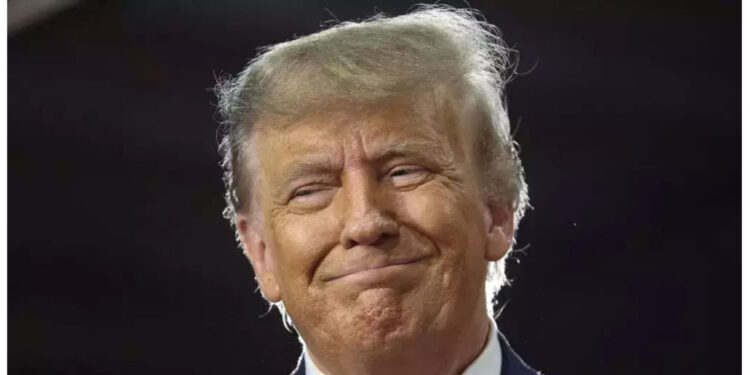Jack Smith, the special counsel, urged the justices to swiftly address Trump’s allegations and proceed with the trial, which had initially been slated to commence last month.
During the oral arguments, it became apparent that several justices preferred to send the case back to a lower court to determine which of Trump’s actions, as stated in the indictment, are directly linked to his official duties.
During the hearing, Justice Brett Kavanaugh raised a question to Sauer, acknowledging that some of the acts mentioned in the indictment were private, while others were official. Kavanaugh asked whether it was Sauer’s position that the analysis of categorizing these acts should be conducted by either the DC circuit or the District Court.
According to Kavanaugh, the responsibility of determining the distinction between Trump’s official and private actions may fall upon US District Court Judge Tanya Chutkan in DC. Judge Chutkan could potentially oversee the case and make a ruling.
If there were a delay of this nature, it would become extremely challenging for Smith to prosecute Trump prior to the November election. In the event that Trump were to emerge victorious against President Joe Biden, it is not difficult to imagine how he would exploit his presidential authority to evade the charges.
Prosecuting Trump is the primary way for Smith to hold the former president accountable for his efforts to overturn the 2020 election.
John Sauer, Trump’s lawyer, made the case that a former president should have complete immunity for actions that may only have a loose connection to the president’s actual duties. He based his arguments on a previous Supreme Court case that established the boundaries of presidential immunity in civil matters.
Jabin Botsford captured this stunning photograph for The Washington Post via Getty Images.
Justice Samuel Alito and other conservative justices on the court appeared to be particularly empathetic towards Sauer’s argument. Sauer emphasized the need for a stringent standard that would make it difficult for courts or prosecutors to question a president’s actions retroactively, especially when the president’s actions may have violated the law.
Alito’s enthusiasm for the cause seemed unmatched among the justices.
Justice Amy Coney Barrett, despite her skepticism towards Sauer’s other arguments, hinted that Smith’s team might need to make significant changes to the current indictment against Trump if they wish to expedite the case.
According to Barrett, the special counsel might concentrate exclusively on actions performed by Trump outside of his official duties.
Michael Dreeben, the advocate for Smith’s team, appeared hesitant about accepting such a solution.
“We believe there is a comprehensive conspiracy at play here, as stated in the indictment. This conspiracy involves collaboration with private lawyers to carry out fraudulent activities. Furthermore, the petitioner has utilized his official powers in an attempt to increase the likelihood of success for these conspiracies,” Dreeben expressed in response. “Our intention is to present the jury with a cohesive narrative, showcasing the sequence of events and the seriousness of the actions taken. This will help them understand the gravity of each step and the reasons behind them.”
During the proceedings, Barrett and the other justices probed Sauer and Dreeben to meticulously examine specific instances of Trump’s behavior as detailed in the indictment.
The Supreme Court may decide that a lower court is better equipped to conduct a thorough review of Trump’s conduct.
Justice Ketanji Brown Jackson raised a thought-provoking plea to her colleagues, urging them to consider whether the current case is the most suitable one to establish a clear boundary for all future presidents regarding what constitutes an “official act” within their professional responsibilities.
Jackson questioned whether this was the appropriate platform to establish a test that delves into the distinction between core and non-core officials.
However, it appears that Jackson’s colleagues are not likely to be open to such a perspective, considering the arguments put forth on Thursday and recent events.
In June 2022, Chief Justice John Roberts expressed his disapproval towards the conservative justices on the court for not confining their ruling in Dobbs v. Jackon to the specific details of the abortion rights case at hand. A 5-4 majority, led by Justice Alito, went so far as to explicitly overturn Roe v. Wade. This decision raised concerns among the conservative justices, who had previously voiced similar reservations regarding Justice Anthony Kennedy’s majority opinion in Obergefell v. Hodges, which recognized a nationwide right to same-sex marriage.
Alito and Kavanaugh, among other conservative justices, expressed their concerns regarding Trump’s conduct as stated in the indictment. However, their worries extended beyond just his alleged actions.
Justice Neil Gorsuch expressed his appreciation for the input, while also emphasizing the importance of creating a rule that stands the test of time.
Waiting for such a rule would be beneficial for Trump.
Crafting a standard and then determining its applicability to him would be a time-consuming process, allowing Trump to effectively evade federal prosecution for any offenses committed after the 2020 election.










